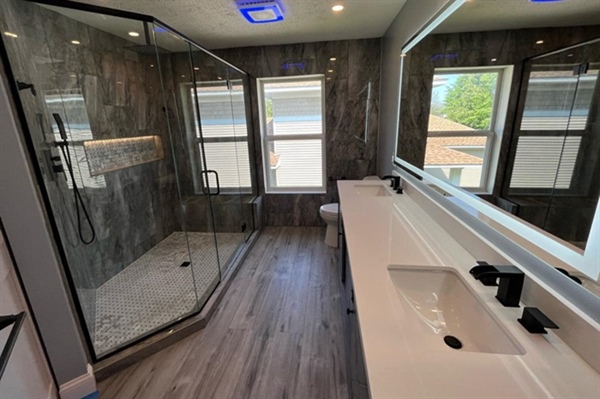Planning a Kitchen or Bathroom Remodel? Here's What to Know

Planning a kitchen or bathroom remodel involves more than just choosing new countertops and fixtures. Homeowners must also consider the plumbing system to ensure that their newly renovated space functions efficiently.
Plumbing upgrades, fixture selection, and budget management are critical to a remodel's success. Overlooking these aspects can lead to unexpected costs and complications, so it's essential to plan ahead.
In this article, we’ll explore key considerations for a successful remodel, including how plumbing upgrades can enhance functionality, common plumbing challenges and solutions, the impact of fixture choices on water efficiency, necessary permits for plumbing work, and budget management strategies.
Understanding these elements will help homeowners make informed decisions and avoid costly mistakes. Whether upgrading for aesthetics or efficiency, careful planning will ensure a seamless renovation process.
Plumbing Upgrades to Enhance the Functionality of a Remodeled Kitchen or Bathroom
Plumbing upgrades can significantly improve the functionality of a remodeled kitchen or bathroom by optimizing water flow, increasing efficiency, and preventing future issues.
- Upgrading old pipes to modern PEX or copper piping reduces the risk of leaks and enhances water pressure.
- Additionally, relocating plumbing lines to accommodate a new layout can improve usability and ensure that fixtures are conveniently positioned.
- Modern plumbing innovations, such as touchless faucets, pot fillers, and high-efficiency toilets, provide enhanced convenience and water conservation.
- Water filtration systems can also be integrated to improve water quality for drinking and cooking.
- In bathrooms, upgrades like thermostatic shower valves allow precise temperature control, improving user comfort and safety.
Beyond convenience, advanced plumbing solutions contribute to energy efficiency. For example, tankless water heaters provide hot water on demand, reducing energy consumption.
Upgrading drainage systems prevents clogs and backups, ensuring long-term functionality.
Common Plumbing Challenges During a Remodel, & How to Address Them
One of the most frequent remodeling plumbing challenges is outdated or incompatible piping. Older homes may have galvanized pipes that corrode over time, leading to leaks or restricted water flow.
Replacing these with modern materials like PEX or copper ensures durability and efficiency. Hidden leaks and structural issues may also arise during demolition, requiring immediate attention to prevent costly water damage.
Another common issue is improper drain slope and venting, leading to slow drainage or sewer gas buildup. Ensuring proper slope and installing air admittance valves (AAVs) can resolve these issues.
Relocating plumbing lines can also be challenging due to structural constraints, necessitating professional planning to ensure compliance with local building codes.
Unexpected permit requirements and inspection delays can also disrupt a remodeling timeline. Working with an experienced plumber familiar with local regulations can help navigate these hurdles efficiently.
Homeowners should conduct thorough pre-project inspections to identify potential complications early and budget accordingly for unexpected repairs.
The Choice of Fixtures & Water Efficiency in Remodeled Spaces
Choosing the right fixtures is crucial for water conservation and long-term cost savings. High-efficiency toilets (HETs) use significantly less water per flush than traditional models, reducing overall water consumption. Dual-flush toilets offer additional savings by allowing users to select a lower water volume for liquid waste and a higher volume for solids.
Faucet aerators and low-flow showerheads also contribute to water efficiency by reducing flow rates without compromising performance. These fixtures maintain strong water pressure while using up to 50% less water. In kitchens, touchless faucets minimize water waste by shutting off automatically when not in use, preventing unnecessary water flow.
Energy-efficient water heaters, such as tankless or hybrid models, enhance efficiency by providing only hot water when needed, eliminating standby heat loss.
Selecting WaterSense-certified fixtures ensures compliance with environmental standards and provides long-term savings on water bills. Homeowners should prioritize these options to enhance sustainability and reduce utility costs.
Permits Typically Required for Plumbing Work in Remodels
Plumbing permits are generally required for major remodels involving new piping, fixture relocation, or water heater replacement. Local building codes dictate specific requirements, and permits ensure compliance with safety standards. Before starting the project, homeowners should check with their municipality to determine which permits are necessary.
In most cases, a permit is required to alter existing plumbing lines, install a new drainage system, or upgrade gas lines. Inspections are typically conducted at different stages to verify that the work meets code requirements. Failure to obtain permits can result in fines, project delays, or complications when selling the home.
Hiring a licensed plumber ensures compliance with permit regulations and prevents costly mistakes. Professional plumbers handle permit applications, schedule inspections, and ensure that installations meet code standards, reducing the risk of future plumbing failures.
Ensure Your Remodel Stays Within Budget Without Compromising on Quality
Effective budgeting requires balancing cost and quality. Homeowners should start by setting a realistic budget that includes materials, labor, and potential unexpected expenses. Prioritizing essential upgrades, such as plumbing improvements, prevents costly repairs later.
Comparing fixture prices and opting for mid-range, high-efficiency products offers both quality and affordability. Shopping during sales, exploring contractor discounts, and purchasing materials in bulk can help reduce costs. Additionally, avoiding unnecessary structural changes, such as moving plumbing lines extensively, minimizes labor expenses.
Working with a reputable plumbing contractor ensures transparent pricing and prevents budget overruns. Modern Plumbing & Heating provides expert services tailored to your remodeling needs. For assistance with budgeting and project planning, visit Modern Plumbing & Heating's office or call us at 763-639-1632.